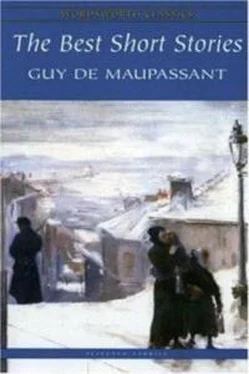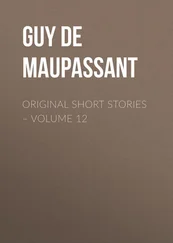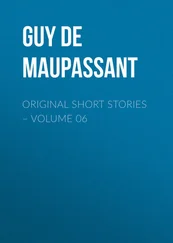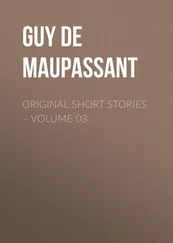Boivin, who knew the beer garden, wished to go there, exclaiming: "The food is very good, and it isn't expensive; you'll see. Anyhow, Monsieur Patissot, you needn't expect to get me tipsy the way you did last Sunday. My wife was furious, you know; and she has sworn never to forgive you!"
The fat gentleman declared that he would only eat at the Elms, because it was an excellent place and the cooking was as good as in the best restaurants in Paris.
"Do as you wish," declared Boivin; "I am going where I am accustomed to go." He left. Patissot, displeased at his friend's actions, followed the fat gentleman.
They ate together, exchanged ideas, discussed opinions and found that they were made for each other.
After the meal everyone started to fish again, but the two new friends left together. Following along the banks, they stopped near the railroad bridge and, still talking, they threw their lines in the water. The fish still refused to bite, but Patissot was now making the best of it.
A family was approaching. The father, whose whiskers stamped him as a judge, was holding an extraordinarily long rod; three boys of different sizes were carrying poles of different lengths, according to age; and the mother, who was very stout, gracefully manoeuvred a charming rod with a ribbon tied to the handle. The father bowed and asked:
"Is this spot good, gentlemen?" Patissot was going to speak, when his friend answered: "Fine!" The whole family smiled and settled down beside the fishermen. The Patissot was seized with a wild desire to catch a fish, just one, any kind, any size, in order to win the consideration of these people; so he began to handle his rod as he had seen Boivin do in the morning. He would let the cork follow the current to the end of the line, jerk the hooks out of the water, make them describe a large circle in the air and throw them out again a little higher up. He had even, as he thought, caught the knack of doing this movement gracefully. He had just jerked his line out rapidly when he felt it caught in something behind him. He tugged, and a scream burst from behind him. He perceived, caught on one of his hooks, and describing in the air a curve like a meteor, a magnificent hat which he placed right in the middle of the river.
He turned around, bewildered, dropping his pole, which followed the hat down the stream, while the fat gentleman, his new friend, lay on his back and roared with laughter. The lady, hatless and astounded, choked with anger; her husband was outraged and demanded the price of the hat, and Patissot paid about three times its value.
Then the family departed in a very dignified manner.
Patissot took another rod, and, until nightfall, he gave baths to sand worms. His neighbor was sleeping peacefully on the grass. Toward seven in the evening he awoke.
"Let's go away from here!" he said.
Then Patissot withdrew his line, gave a cry and sat down hard from astonishment. At the end of the string was a tiny little fish. When they looked at him more closely they found that he had been hooked through the stomach; the hook had caught him as it was being drawn out of the water.
Patissot was filled with a boundless, triumphant joy; he wished to have the fish fried for himself alone.
During the dinner the friends grew still more intimate. He learned that the fat gentleman lived at Argenteuil and had been sailing boats for thirty years without losing interest in the sport. He accepted to take luncheon with him the following Sunday and to take a sail in his friend's clipper, Plongeon. He became so interested in the conversation that he forgot all about his catch. He did not remember it until after the coffee, and he demanded that it be brought him. It was alone in the middle of a platter, and looked like a yellow, twisted match, But he ate it with pride and relish, and at night, on the omnibus, he told his neighbors that he had caught fourteen pounds of fish during the day.
TWO CELEBRITIES
Monsieur Patissot had promised his friend, the boating man, that he would spend the following Sunday with him. An unforeseen occurrence changed his plan. One evening, on the boulevard, he met one of his cousins whom he saw but very seldom. He was a pleasant journalist, well received in all classes of society, who offered to show Patissot many interesting things.
"What are you going to do next Sunday?"
"I'm going boating at Argenteuil."
"Come on! Boating is an awful bore; there is no variety to it. Listen —I'll take you along with me. I'll introduce you to two celebrities. We will visit the homes of two artists."
"But I have been ordered to go to the country!"
"That's just where we'll go. On the way we'll call on Meissonier, at his place in Poissy; then we'll walk over to Medan, where Zola lives. I have been commissioned to obtain his next novel for our newspaper."
Patissot, wild with joy, accepted the invitation. He even bought a new frock coat, as his own was too much worn to make a good appearance. He was terribly afraid of saying something foolish either to the artist or to the man of letters, as do people who speak of an art which they have never professed.
He mentioned his fears to his cousin, who laughed and answered: "Pshaw! Just pay them compliments, nothing but compliments, always compliments; in that way, if you say anything foolish it will be overlooked. Do you know Meissonier's paintings?"
"I should say I do."
"Have you read the Rougon–Macquart series?"
"From first to last."
"That's enough. Mention a painting from time to time, speak of a novel here and there and add:
"'Superb! Extraordinary! Delightful technique! Wonderfully powerful!' In that way you can always get along. I know that those two are very blase about everything, but admiration always pleases an artist."
Sunday morning they left for Poissy.
Just a few steps from the station, at the end of the church square, they found Meissonier's property. After passing through a low door, painted red, which led into a beautiful alley of vines, the journalist stopped and, turning toward his companion, asked:
"What is your idea of Meissonier?"
Patissot hesitated. At last he decided: "A little man, well groomed, clean shaven, a soldierly appearance." The other smiled: "All right, come along." A quaint building in the form of a chalet appeared to the left; and to the right side, almost opposite, was the main house. It was a strange–looking building, where there was a mixture of everything, a mingling of Gothic fortress, manor, villa, hut, residence, cathedral, mosque, pyramid, a, weird combination of Eastern and Western architecture. The style was complicated enough to set a classical architect crazy, and yet there was something whimsical and pretty about it. It had been invented and built under the direction of the artist.
They went in; a collection of trunks encumbered a little parlor. A little man appeared, dressed in a jumper. The striking thing about him was his beard. He bowed to the journalist, and said: "My dear sir, I hope that you will excuse me; I only returned yesterday, and everything is all upset here. Please be seated." The other refused, excusing himself: "My dear master, I only dropped in to pay my respects while passing by." Patissot, very much embarrassed, was bowing at every word of his friend's, as though moving automatically, and he murmured, stammering: "What a su—su—superb property!" The artist, flattered, smiled, and suggested visiting it.
He led them first to a little pavilion of feudal aspect, where his former studio was. Then they crossed a parlor, a dining–room, a vestibule full of beautiful works of art, of beautiful Beauvais, Gobelin and Flanders tapestries. But the strange external luxury of ornamentation became, inside, a revel of immense stairways. A magnificent grand stairway, a secret stairway in one tower, a servants' stairway in another, stairways everywhere! Patissot, by chance, opened a door and stepped back astonished. It was a veritable temple, this place of which respectable people only mention the name in English, an original and charming sanctuary in exquisite taste, fitted up like a pagoda, and the decoration of which must certainly have caused a great effort.
Читать дальше












